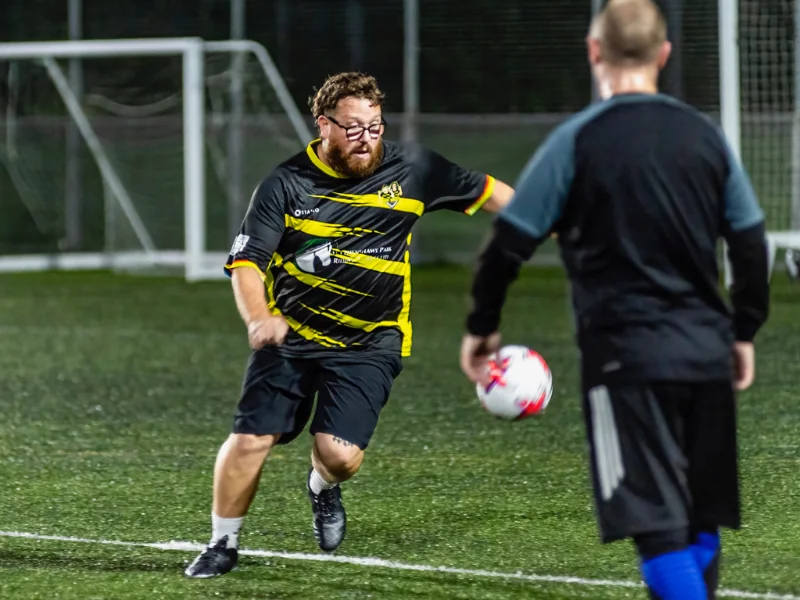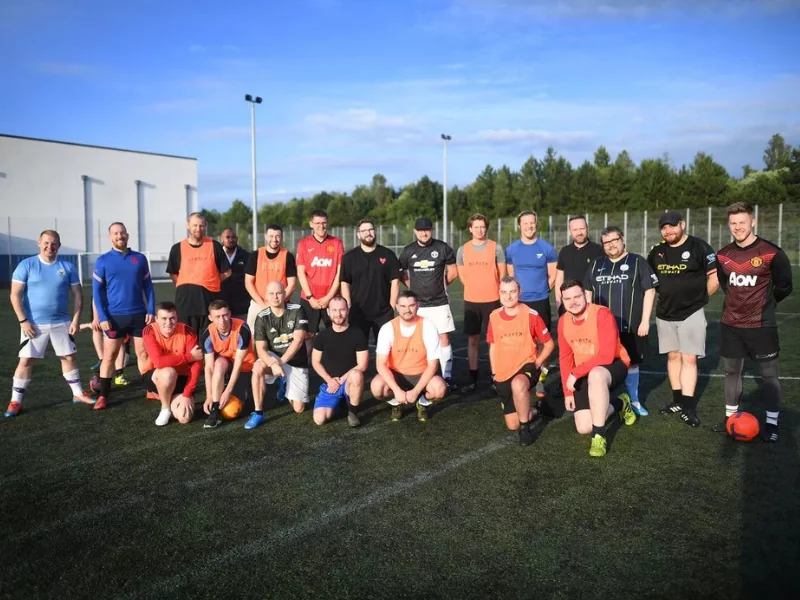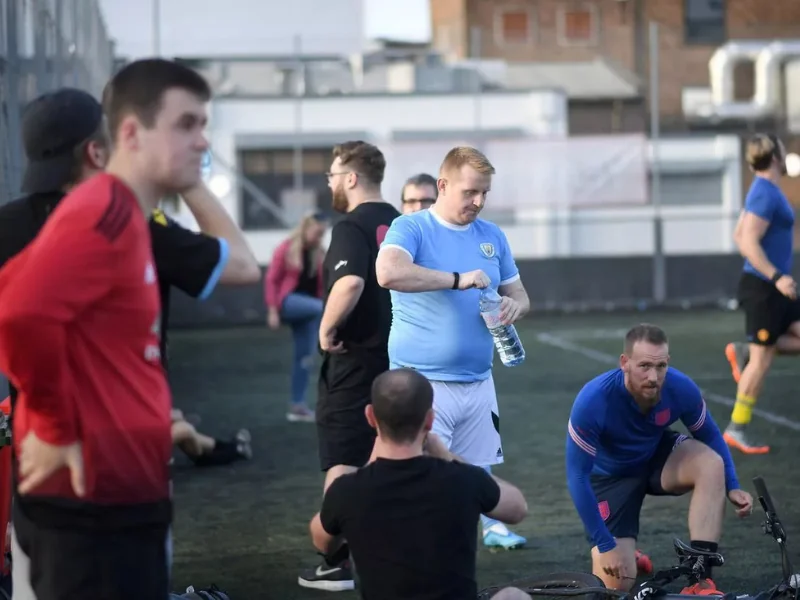As part of I AM’s mission to celebrate the autistic community, we are expanding our popular ‘10 Questions With…’ series to spotlight disability sport providers, clubs, and individuals who have made a significant impact in sports in and around Manchester. In our latest Sporting Life interview, we sit down with Joe Farrar, the founder and driving force behind Happy Somedays, a Manchester-based “sports incentive” group that champions inclusive, no-pressure opportunities for everyone.
1. Happy Somedays emphasises inclusivity in football. How do you think sports and activities like this help autistic individuals build confidence and social skills?
A big thing for me – and something I think HS does well – is that it treats everyone as an equal, including those who are autistic. I think that alone helps grow someone’s confidence. Creating a safe and encouraging environment in which someone can thrive is also crucial. These are all requirements for an enjoyable sports setting. Once that is in place, the amazing byproduct I have seen is the social aspect: friendships being made and more positive things happening!
2. The club promotes a supportive environment for players of all abilities. How important is it to tailor autism provisions to individual needs in a group setting like this? Can you share examples of strategies or approaches that balance personalised support with group cohesion? What are the challenges in ensuring every participant feels supported, and how can these be overcome?
I have some great memories and have made many lifelong friendships.Treating everyone as equals sparks confidence and friendships!
The first step for me was speaking to a friend – and a participant of our sessions – who is autistic. He was at our very first session, and everything was new, so we wanted to make sure that if anyone came, they were supported and we knew how to best help them feel comfortable.
I make no illusions; I’m not an expert on the subject. I’m learning every day from many different people, but I do believe that open discussion, education, and small adjustments help ensure this becomes a reality.
3. What role do you think community-led initiatives like Happy Somedays play in bridging the gap between neurotypical and neurodiverse individuals?
It’s inclusion: everyone being on the same page and supporting each other will only help bridge the gap and, in turn, help everyone learn about one another.

4. How do you measure the impact of Happy Somedays on participants and the wider community?
We gauge our impact in a few ways. First, through direct feedback from participants – seeing autistic members talk about feeling more confident or making friends is a clear sign. Second, by tracking attendance trends: as word spreads, more families and individuals show up, which tells us we’re meeting a real need. Finally, community recognition – being featured in local awards and receiving messages from schools or other organisations – also indicates that we’re creating positive change beyond the sessions themselves.
Inclusion helps us learn from and support each other.
5. Autistic individuals often have unique strengths and talents. How can programmes like Happy Somedays help participants showcase these strengths while building confidence?
We encourage it. For example, I mentioned a participant with autism who helps us – he’s on the committee and excels when it comes to business (even though we’re not a business). It’s good to have someone with a business mind. He’s also completed FA coaching training and attends events with us to network. If someone has a strength or an area they want to expand, HS will always encourage them, help them develop it, and support their learning.
6. If you could host a Christmas party for Happy Somedays players, what three autism-friendly activities would you include to make it special?
I’d ensure it’s not overbearing, too loud, or too busy. I’d make sure it was enjoyable and a positive sensory experience.

7. What are your future plans for Happy Somedays, and how do you hope to expand the programme?
We’re looking to add more diverse sessions – beyond football, perhaps partner with local community centres to offer art, music or yoga groups, each with the same inclusive ethos. We also plan to collaborate with neighbouring towns so that families who can’t travel to Wythenshawe still have access to autism-friendly sports. Securing modest sponsorships will help us provide specialised equipment or transportation assistance, ensuring no one is left out due to cost or logistical barriers.
8. If you could give the Happy Somedays team a special Christmas gift to enhance their sessions, what would it be and why?
We were recently let down by a kit provider, so we are without a football kit in case the other team’s kit clashes. Therefore, I’d love to get everyone a new kit!
9. Imagine creating a holiday-themed football session for Happy Somedays. What would your “Christmas training drills” or activities look like?
I considered a Christmas jumper night where we all wear festive jumpers—maybe a big game with a team of elves versus a team of Santas.
Our club is for everyone—no matter your ability or background.
10. If you could invite a famous footballer or footballers to visit Happy Somedays this Christmas, who would you pick, and how do you think they could inspire the players?
Paul Scholes would be a great choice. I learned his son has autism and is non-verbal. I’d like him to see that there are groups nearby that want to give people the opportunity to play the sport he dedicated his life to.

For more information on Happy Somedays, please visit https://happysomedays.co.uk/
If you are a sporting provider or someone who have made their mark in sport and are interested in taking part in a Sporting Life interview, please drop us an email at enquiries@i-am-autism.org.uk



